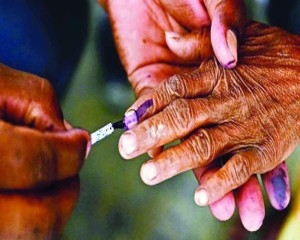 Both the Centre and States should focus on governance for a full five years without any distraction and implement structural reforms for sustainable development besides saving tens of thousands of crores in election expenses. Let’s at least debate the idea
Both the Centre and States should focus on governance for a full five years without any distraction and implement structural reforms for sustainable development besides saving tens of thousands of crores in election expenses. Let’s at least debate the idea
The Prime Minister’s idea of “one nation, one election” is being staunchly opposed by many political parties, mainly on the grounds of it being undemocratic and an assault on the federal polity and, hence, unconstitutional. Opposition parties have argued that in the case of simultaneous poll to both Parliament and State Assemblies, national issues will dominate over State-specific subjects. This may yield fortuitous benefit to the dominant national party as the voter won’t be able to clearly articulate his/her choice while casting the vote to elect members to the Assembly.
Thus, a national party, which gets a clear majority in the Lok Sabha and which does not enjoy the confidence of the State subjects on local issues, will get to rule the States, too. Most parties fear that in the pursuit of “one party rule,” the Modi-Shah duo intends to use the “one nation, one election” idea to install and perpetuate the BJP-led Government across the country.
Frankly, the political apprehensions need to be dispelled. One might argue that while voting at the same time for the Parliament and the Assembly, the choice of the voter will get obliterated. Yes the centrist party stands to benefit from a nationalist swell, particularly if it is in a dominant position in the State. And unless the voter is able to make educated and informed choices on local and national issues, things could go its way. But we should not under-estimate the voter as is amply corroborated by the just-concluded Lok Sabha polls. Elections to some State Assemblies, viz Andhra Pradesh and Odisha, were held co-terminus. Despite an overriding national narrative favouring Prime Minister Modi, voters in these States showed clear preference for regional parties, namely the YSR Congress and the Biju Janata Dal, who got an absolute majority. Just because the voters exercised franchise at the same time for both the Lok Sabha and the State did not deter them from giving overriding importance to local issues. Nevertheless, one cannot write off the possibility that there could be uniformity of narratives.
Critics have also raised doubts about uncertainties that could arise if the ruling party loses the vote of confidence before its mandated term. But they need to recognise that these can at best be a rare situation and not a matter of routine (public gives mandate to a Government to run its full-term and all stakeholders should ensure that this is honoured). Still, such a scenario (albeit rare) can be addressed by either electing a new leader (who enjoys the confidence of the House) or holding fresh election for the “residual” term.
Even so, our forefathers had contemplated simultaneous elections only. Things were on the right track till the mid-1960s, when the then ruling dispensation disturbed the applecart by “premature” dissolution of some State Assemblies (1968/1969) and the Lok Sabha (1970). With the dismissal of many more elected Governments (courtesy, misuse of Article 356 on most occasions) thereafter, the mis-match got aggravated.
At present, a State Assembly goes to polls almost every other year. Of course, this does jeopardise the continuity and implementation of Central policies in a continuous manner. This imposes unprecedented social and economic cost on the nation. It is not just the official expense of conducting elections (in a big state like Maharashtra, it can go up to Rs 1,000 of crores) but also several thousand crores being spent by political parties. In turn, this gives boost to corruption and other unethical practices even as parties seek to raise funds to support the mammoth expenditure.
The bigger damage, however, arises due to distraction from issues of governance (as parties are in election mode all through) even as the imposition of the Model Code of Conduct (MCC) — each time an election exercise is taken up — leads to stoppage of all major policy decisions which impede development (a case in point is delay in completion of the‘dedicated freight corridor’ project).
Furthermore, with almost every political party prone to promising more and more sops/subsidies to win elections, no incumbent Government has the gumption to implement hard reforms, which would entail withdrawal of certain subsidies like fertilisers and power among others, not even to the better-off sections of the society or not so poor. Forget that, it can’t even take harsh measures needed to rein in power theft due to the fear of losing its vote bank in jhuggis/slums.
This subsisting chaotic system needs attention. Both the Centre and States should focus on governance for a full five years without any distraction and implement structural reforms for sustainable development besides saving tens of thousands of crores in election expenses. It would also pave the way for electoral reforms. Of course, the ball has just got rolling. Let there be a comprehensive debate.
(The writer is a policy analyst)
https://www.dailypioneer.com/2019/columnists/some-merit-in—-one-poll—-idea.html